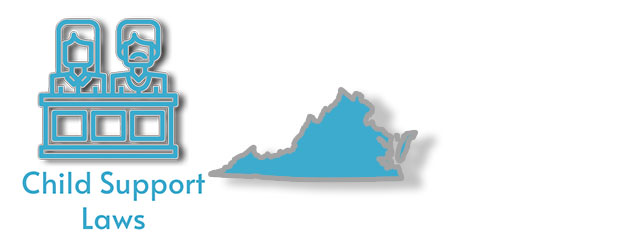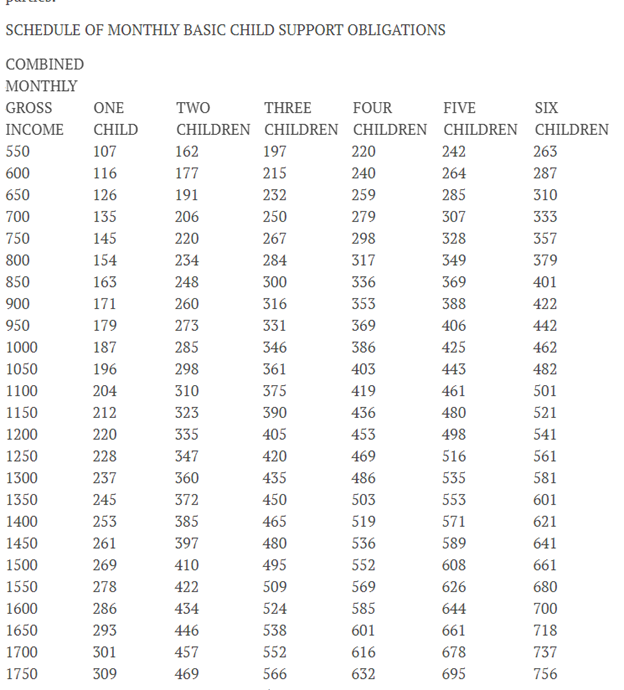
Virginia child support laws say that upkeep is a legal obligation and that parents, whether married on unmarried, must provide support to their dependents until emancipation.
However, under state law, a father in Virginia has no legal rights towards the child if the couple is unmarried and paternity is unknown. Thus, you must obtain a court order to gain custody and visitation rights. This situation creates a lot of friction between the parents, so it pays for each caregiver to know how exactly the judge awards upkeep obligations and your rights as a parent.
Separated or divorced parents may also have to cope with a partner that refuses to care for the child. So today, we look at both sides of the divide. Meaning, custodial, and non-custodial parents in Virginia may find all the important child support answers below.
That is where we begin our discussion. Below is everything parents in Virginia must know about child support.
How to Apply for Child Support in Virginia
The Virginia Department of Social Services through the DCSE (Division of Child Support Enforcement). Has the authority to provide upkeep services including, paternity establishment, location of biological and putative parents, child support order establishment and modification, collection and distribution of child support, and the collection and distribution of medical support payments.
So, to apply, visit the MyChild Support Customer Service portal and create an account.
Alternatively, you may download the linked application form below, complete it, then mail it to P.O.BOX 570, RICHMOND, VA 23218-0570, or drop it at the nearest child support office in your area.
Virginia Support Enforcement Services Application (EN).
You may also call 1-800-468-8894 if you have any questions.
What to remember:
- Parents who have never received TANF (Temporary Assistance for Needy Families) must pay an annual $25 service fee. You may also have to pay, attorney, intercept, genetic testing, and other applicable fees.
- All parents subject to child support orders must provide their social security numbers to the DCSE.
- The DCSE cannot provide legal assistance to you. Therefore, consult or work with a family court attorney if necessary.
- The DCSE expects you to provide as much information as you can, cooperate, communicate, and either parent must keep the agency informed of changes in your financial circumstances.
- Failure to communicate promptly may cause DCSE to close your case.
How is paternity established in Virginia?
Virginia child support laws work under the presumption that if a child is born to a married couple, or if the couple was married at least ten months before a child’s birth. Then the man is the father.
That said.
There are four ways to establish paternity in Virginia. One is by marriage as explained above. Two is through Voluntary Acknowledgement of Paternity (VOP), where both parents sign a VOP form at the hospital after childbirth or later at any child support office.
Three, you may open a child support case through the DCSE and thus establish paternity via administrative order. Or four, you may opt for Judicial Establishment, where you petition the court to require the other parent to take a paternity test.
If you are unsure of a child’s paternity, request a paternity application form here or call 1-800-468-8894.
What to remember:
- Paternity establishment grants the father legal rights and responsibilities including visitation, upkeep payment, medical support, and custody rights.
- The DCSE charges $30 per person for DNA testing.
- Paternity establishment grants the child inheritance rights and other benefits including, certain types of social security or veteran benefits.
- Either parent may petition the court for a paternity test.
How is Child Support Determined in Virginia?
According to Virginia child support guidelines, the courts or DCSE determine child support as shown below.
- Combine the gross incomes of both parents. Gross income here refers to income(s) from all sources.
- After that, the court will cross-reference the parents combined gross income(s) with the state schedule of Monthly Basic Child Support Obligation table. (keep reading).
- To the basic obligation, the court adds the cost of health insurance and child care expenses.
- The resulting amount is the total child support obligation which is then apportioned between the parents based on their respective incomes.
Confusing, right?
Let me explain.
How to calculate child support in Virginia?
The easy way to estimate your obligation is to use the state-provided child support worksheet.
The worksheet you use depends on the nature of your custody arrangement. Meaning Parents who have sole custody may use Va. Code 20-108.2 Child Support Guidelines Worksheet. Whereas, if you have split or joint custody, complete the shared custody worksheet.
Code of Virginia 20-18.2. B. reads in part, “For purposes of the application of the guideline, a basic child support obligation shall be computed using the schedule set out below. For combined monthly gross income amounts falling between amounts shown in the schedule, basic child support obligation amounts shall be extrapolated. However, unless one of the following exemptions applies where the sole custody child support obligation as computed pursuant to subdivision G 1 is less than the statutory minimum per month, there shall be a presumptive minimum child support obligation of the statutory minimum per month payable by the payor parent”.
What that means is, after you get an estimate, cross-reference it with the schedule of Monthly Basic Child Support Obligation shown below.

Monthly Basic Child Support Obligation.
However, using the table or online calculators will only produce estimates, meaning your court-ordered amount might be very different. Also, if the resulting figure does not produce an amount that is not in the best interests of the child(ren). Virginia child support guidelines allow the judge to deviate. What do I mean?
22VAC40-880-240 (Administrative Deviation) says that grounds for deviation in Virginia include factors such as monetary support for other families, voluntary unemployment or underemployment, upkeep related debts, cost of insurance and so.
What that means is parents in the state may petition for an increase or decrease in the support amount. But you must show the court a reason for a change in your support order. For example, if you have other dependents in your home, you may push for a reduction.
However, it is up to the judge to decide what is in the best interests of the child.
How to Modify Child Support in Virginia
In Virginia, a petition for modification for a child support order may increase, decrease child support, or neither. That means before you push for modification. You should have a good reason.
What do I mean?
Virginia child support laws allow upkeep order reviews every three years after entry, modification, or review. However, before the three-year waiting period is over, a parent may only petition for review if he or she experiences a current and continuing change in financial circumstances. For example, if the custody arrangement changes or if one child gets emancipated, the paying parent may petition the court for a reduction.
On the other hand, if the cost of medical insurance changes or if the other parent’s income increases. You may petition the court for an increase.
To request a review, you must submit a written request to the office of child support enforcement along with any supporting documents. The parents may also agree on changes amongst themselves and avoid having to go to court.
Download Request for Review and Adjustment Form Here.
What to remember:
- To apply for a review, you must also submit financial forms, health insurance verification form along with the Review and Adjustment Packet (linked above).
- The burden of proof is on the petitioning parent, so gather as much evidence as you can.
- You may only withdraw a written review request via a written request.
- You may request a review if child care expenses increase or decrease by at least 25%.
For modification services, contact the DSS through this number 1-800-468-8894.
What happens if you do not pay child support in Virginia?
Like in all states, all child support orders in Virginia contain an income withholding order. Meaning, once a child support order is established, the law requires the paying parent’s employer to garnish child support directly from the payor’s salary, wages, or income.
However, the DCSE or court may enforce child support using the following tools.
- Liens on property: if your child support arrears are equal to or greater than $1000. The DCSE may place a renewable lien on your property that preserves the debt for 20 years.
- Order to withhold/order to deliver: this option gives the DCSE the option to garnish child support from the delinquent parent’s bank account or other assets.
- Seizure and sale: the DCSE may seize and sell the non-custodial parents’ assets through the SAFE (Seize Assets for Enforcement) program.
- License suspension: the DCSE, through other state agencies, may suspend the delinquent parents’ drivers, recreational or business license.
- State, local, and federal income tax intercept.
- If the paying parent is in the military, the DSCE may apply additional remedies.
What to remember:
- Longarm provisions (UIFSA): this option permits Virginia to claim personal jurisdiction over a parent in another state.
- Instead of jail, the court may refer the delinquent parent to the Intensive Case Monitor Program.
Contempt of court charges and Criminal nonsupport in Virginia
According to Virginia Child Support Guidelines, failure to pay child support is a misdemeanor that is punishable by up to 12 months in jail and or a $500 fine. The judge may also place the parent on a 12-month work release program.
If a parent willfully and knowingly fails to provide child support in Virginia, he or she may face criminal contempt or civil contempt charges. In either case, the judge will summon the accused to explain his or her failure.
What to remember:
- The amount of child support owed determines whether the court will pursue felony or misdemeanor charges.
- To avoid enforcement action, parents should contact the DCSE or court whenever your financial circumstances change.
- The DCSE only resorts to court action after it exhausts the enforcement options above.
- Incarceration is usually the last resort in child support cases, meaning you can avoid it by paying your arrears or by establishing a payment plan.
When does child support end in Virginia?
Your child support order should include the date when payments will cease. But normally child support terminates on the child’s 18th birthday or 19th if the child is in high school.
If the child is disabled mentally or physically, support may continue indefinitely. Also, agreements to provide college or university tuition may extend your obligation until you honor the terms of the contract.
How to end child support early in Virginia
Emancipation is the only way to end child support early in Virginia.
This happens when a minor who is at least 16, guardian or parent petitions the Juvenile and Domestic Relations District Court for emancipation. So, talk to a juvenile court attorney to see if you qualify.
If you are 16, Virginia child support laws require that you have a legal source of income the skills and resources necessary to handle your affairs including housing.
More Virginia Laws